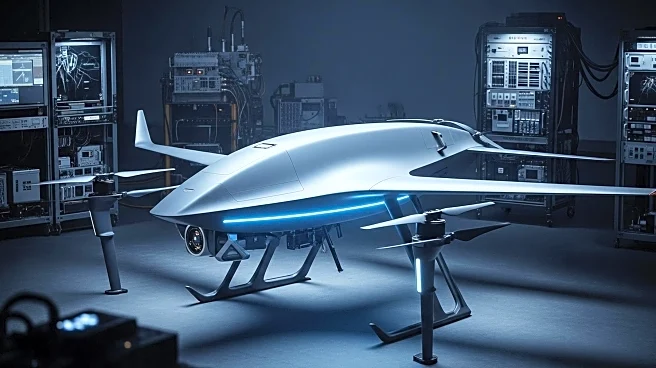What's Happening?
Lockheed Martin's Skunk Works division has introduced a new stealth drone named Vectis, which is set to make its first flight by the end of 2027. The Vectis drone is designed as a large, reusable 'Category 5' aircraft, offering customizable features to adapt to changing threat environments. OJ Sanchez, Vice President and General Manager of Skunk Works, highlighted the drone's best-in-class survivability and flexibility, making it suitable for both U.S. and international markets. Vectis can perform various missions, including air-to-air, air-to-ground, and intelligence, surveillance, and reconnaissance (ISR) operations. It features an open systems architecture, allowing integration with platforms and mission systems not developed by Lockheed Martin. The drone's design incorporates ease of storage and assembly, making it adaptable to customer-specific requirements.
Why It's Important?
The introduction of the Vectis drone represents a significant advancement in autonomous military technology, potentially impacting defense strategies and international collaborations. Its customizable nature allows for tailored solutions to meet diverse operational needs, enhancing its appeal to global markets. The drone's ability to integrate with existing military systems could streamline operations and improve mission effectiveness. As countries seek advanced defense capabilities, Vectis offers a flexible and survivable option, potentially influencing procurement decisions and defense policies. Lockheed Martin's focus on autonomy and open systems architecture reflects a broader trend towards adaptable and interoperable military technologies.
What's Next?
Lockheed Martin plans to conduct further operational analysis and simulations to refine the Vectis drone's capabilities. The company aims to demonstrate the drone's flexibility and survivability in real-world conditions, potentially positioning it as a candidate for the U.S. Air Force's Collaborative Combat Aircraft (CCA) program. As the drone approaches its first flight, Lockheed Martin will continue to engage with potential customers to tailor the Vectis to specific operational requirements. The success of these efforts could lead to increased adoption of the drone by military forces worldwide, influencing future defense strategies and collaborations.
Beyond the Headlines
The development of the Vectis drone highlights ethical considerations surrounding autonomous military technologies, including decision-making in combat scenarios and the potential for reduced human oversight. As these technologies evolve, discussions around international regulations and ethical frameworks will become increasingly important. The drone's adaptability also raises questions about the balance between technological innovation and operational security, as nations navigate the complexities of integrating advanced systems into their defense arsenals.









